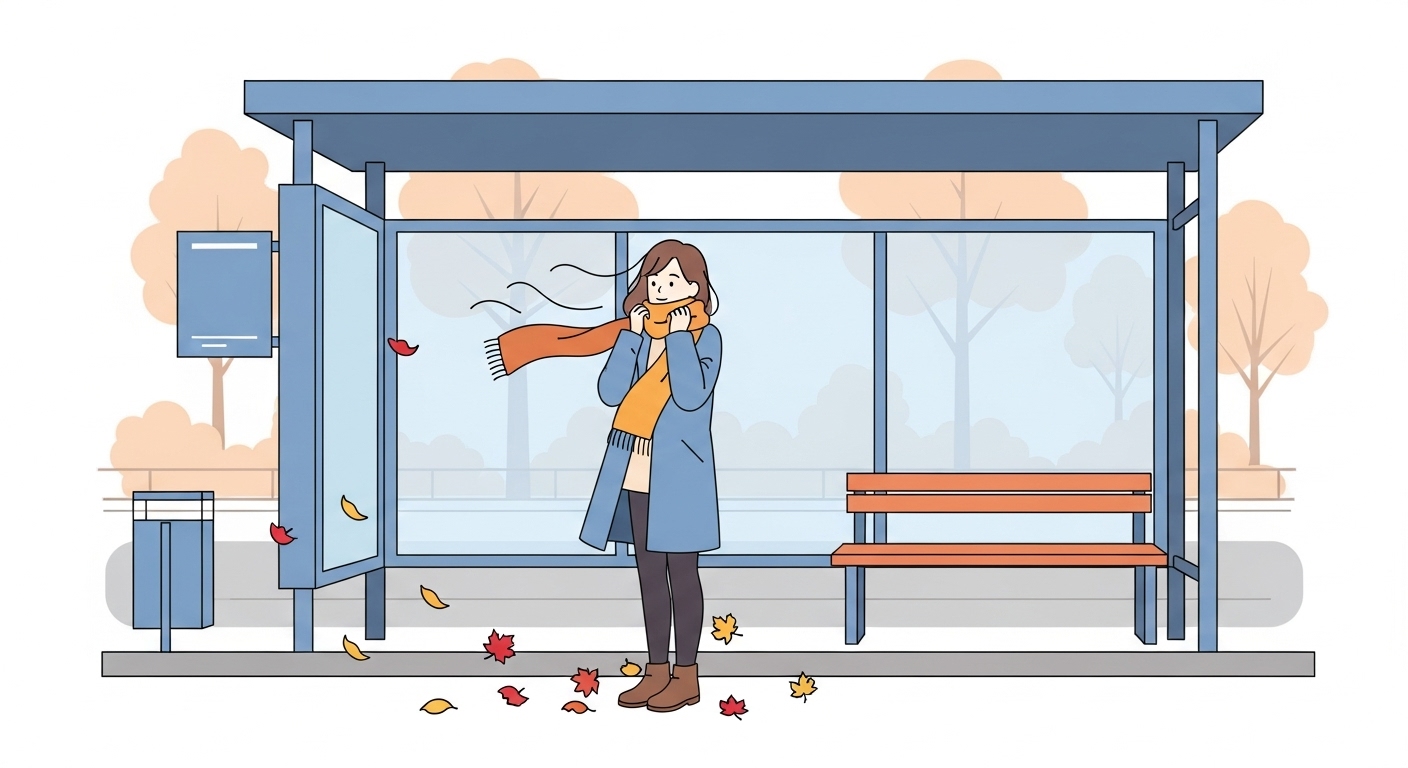秋天真的來了!🍂 最近是不是也感覺早晚都有點涼意?每年這個時候就是「衣櫃換季警報」響起的時候。
在英文裡,我們除了 “It’s cold.”,還有很多更自然又貼近日常的表達。
今天這篇就教你如何用英文聊「天氣變冷」、提醒朋友帶外套別著涼,讓你秋天聊天也超道地!
🎧Apple Podcast | Spotify
💬 Dialogue 情境對話
情境設定:
Amy 和 Leo 在聊天,感覺天氣變涼了,準備去便利商店買熱飲。
🗣️ 英文對話(Autumn Weather Chat)
Amy: Hey Leo, did you notice the weather today? It suddenly got chilly!
Leo: Yeah, I was just thinking the same. I almost forgot my jacket this morning.
Amy: Lucky you didn’t! The wind feels much colder than yesterday.
Leo: Right? It’s that kind of crisp air that tells you autumn’s really here.
Amy: Totally! I love it, though. It’s perfect for hot drinks and cozy sweaters.
Leo: True, but I always catch a cold when the temperature drops like this.
Amy: You should bundle up a bit more. Bring a thin jacket or a scarf next time.
Leo: Good idea. I might grab some hot chocolate later, too.
Amy: That sounds nice. Oh, and maybe bring an umbrella, too—it looks cloudy.
Leo: Seriously? Fall weather never fails to surprise me.
Amy: Haha, yeah. It’s like one minute sunny, the next minute freezing!
Leo: Anyway, thanks for the reminder. I’ll dress warmer tomorrow.
Amy: No problem! Stay warm and don’t catch a cold!
💬 中文翻譯
Amy: 嘿,Leo,你今天有注意到天氣嗎?突然變好冷!
Leo: 對啊,我也有同感。早上差點忘了帶外套。
Amy: 還好你有帶!風比昨天冷多了。
Leo: 沒錯,那種空氣味道一出現就代表秋天真的到了。
Amy: 我也覺得~不過我蠻喜歡這感覺,適合喝熱飲、穿毛衣。
Leo: 我懂,但我每次氣溫一降就容易感冒。
Amy: 你應該多穿一點啦,下次帶件薄外套或圍巾吧。
Leo: 好主意,等等我可能會去買杯熱可可。
Amy: 不錯喔~還有可能要帶傘,看起來快下雨了。
Leo: 真的嗎?秋天的天氣真的難以預測。
Amy: 哈哈對啊,一下子出太陽,一下子又變冷!
Leo: 謝啦提醒我,明天一定多穿點。
Amy: 不客氣~要保暖喔,別感冒!
📚 Vocabulary Boost 重點單字片語
| 單字 / 片語 | 詞性 | 中文意思 | 英文例句 | 中文翻譯 |
|---|---|---|---|---|
| chilly | adj. | 涼颼颼的 | It suddenly got chilly in the evening. | 晚上突然變得涼颼颼的。 |
| crisp air | n. | 涼爽清新的空氣 | I love the crisp air of autumn mornings. | 我喜歡秋天早晨那種清爽的空氣。 |
| cozy | adj. | 溫暖舒服的 | I want to stay in my cozy sweater all day. | 我想一整天都穿著這件舒服的毛衣。 |
| temperature drops | phr. | 氣溫下降 | When the temperature drops, I start craving soup. | 一變冷我就想喝湯。 |
| bundle up | phr. | 穿暖一點 | Don’t forget to bundle up before going out. | 出門前別忘了多穿一點。 |
| scarf | n. | 圍巾 | She always wears a scarf in autumn. | 她秋天一定會圍圍巾。 |
| umbrella | n. | 雨傘 | Bring an umbrella, it might rain. | 帶把傘,可能會下雨喔。 |
| hot chocolate | n. | 熱可可 | Let’s get some hot chocolate after school. | 放學去喝杯熱可可吧。 |
| cloudy | adj. | 多雲的 | It looks cloudy today, doesn’t it? | 今天看起來多雲吧? |
| catch a cold | phr. | 感冒 | I always catch a cold when the weather changes. | 天氣變化我就會感冒。 |
🔍 Sentence Patterns 重點句型
| 句型結構 | 中文意思 | 英文例句 | 中文翻譯 |
|---|---|---|---|
| Did you notice + N? | 你有注意到……嗎? | Did you notice the weather today? | 你今天有注意到天氣嗎? |
| It’s that kind of + N that… | 就是那種……表示…… | It’s that kind of crisp air that tells you autumn’s here. | 那種空氣一出現就代表秋天到了。 |
| It looks + adj. | 看起來…… | It looks cloudy today. | 今天看起來多雲。 |
| Don’t forget to + V. | 別忘了…… | Don’t forget to bundle up. | 別忘了多穿一點。 |
📖 Transcript 逐字稿
J: Welcome to MJ English. Today, we’re looking at something really practical. A conversation you might have any day now, actually about the weather suddenly getting colder—that shift into autumn.
J:今天我們要聊的是一個非常實用的主題,一段你最近很可能會用到的對話,嗯,就是關於天氣突然變冷,進入秋天的那種轉變。
M: Happens every year, doesn’t it? That sudden chill.
M:每年都會這樣對吧?那種突然的涼意。
J: Exactly. So, we’ve got this short chat between Amy and Leo. It’s a really good example. And what we want to do is just,pull out some key vocabulary and maybe some useful phrases from their talk—things you can actually use.
J:沒錯。所以我們準備了一段 Amy 和 Leo 的小對話,算是很不錯的範例。我們會從這段對話中挑出一些關鍵單字和實用句型,都是你日常生活中真的能用得上的。
J: Okay, so first, let’s just listen to the whole conversation between Amy and Leo.
J:好,那我們先來聽聽看 Amy 和 Leo 的完整對話。
Amy 和 Leo 在聊天,感覺天氣變涼了,準備去便利商店買熱飲。
🗣️ 英文對話(Autumn Weather Chat)
Amy: Hey Leo, did you notice the weather today? It suddenly got chilly!
Leo: Yeah, I was just thinking the same. I almost forgot my jacket this morning.
Amy: Lucky you didn’t! The wind feels much colder than yesterday.
Leo: Right? It’s that kind of crisp air that tells you autumn’s really here.
Amy: Totally! I love it, though. It’s perfect for hot drinks and cozy sweaters.
Leo: True, but I always catch a cold when the temperature drops like this.
Amy: You should bundle up a bit more. Bring a thin jacket or a scarf next time.
Leo: Good idea. I might grab some hot chocolate later, too.
Amy: That sounds nice. Oh, and maybe bring an umbrella, too—it looks cloudy.
Leo: Seriously? Fall weather never fails to surprise me.
Amy: Haha, yeah. It’s like one minute sunny, the next minute freezing!
Leo: Anyway, thanks for the reminder. I’ll dress warmer tomorrow.
Amy: No problem! Stay warm and don’t catch a cold!
💬 中文翻譯
Amy: 嘿,Leo,你今天有注意到天氣嗎?突然變好冷!
Leo: 對啊,我也有同感。早上差點忘了帶外套。
Amy: 還好你有帶!風比昨天冷多了。
Leo: 沒錯,那種空氣味道一出現就代表秋天真的到了。
Amy: 我也覺得~不過我蠻喜歡這感覺,適合喝熱飲、穿毛衣。
Leo: 我懂,但我每次氣溫一降就容易感冒。
Amy: 你應該多穿一點啦,下次帶件薄外套或圍巾吧。
Leo: 好主意,等等我可能會去買杯熱可可。
Amy: 不錯喔~還有可能要帶傘,看起來快下雨了。
Leo: 真的嗎?秋天的天氣真的難以預測。
Amy: 哈哈對啊,一下子出太陽,一下子又變冷!
Leo: 謝啦提醒我,明天一定多穿點。
Amy: 不客氣~要保暖喔,別感冒!
M: So that felt pretty natural, right? Like a real quick chat you’d overhear.
M:聽起來是不是很自然?就像是你路邊不小心聽到的那種簡短對話。
J: And there are a few things in there that really make it work, make it sound authentic.
J:而且裡面有幾個地方,真的讓整段對話聽起來很自然,很道地。
M: Yeah, like the words they use.
M:對,像是他們用的字就很貼切。
J: The vocabulary first. For example, Amy starts with “chilly,” not just “cold.”
J:先從字彙來看。像是 Amy 一開始用的是 “chilly” 而不是單純的 “cold”。
M: Right. “Chilly.” What’s the feel of that word? It’s kind of specific, isn’t it?
M:對,”chilly”。這個字給人的感覺很特別對吧?有點具體。
J: It is. “Chilly” is perfect for that first hint of cold. Maybe it’s just in the evening, or the wind picks up. It’s not deep winter cold, it’s…
J:對,它很適合形容那種剛開始變冷的感覺。可能是晚上變涼,或是起風了。不是那種冬天刺骨的冷,而是…
M: Yeah, a bit cool.
M:對,就是有點涼。
M: Less intense than “cold.”
M:比起 “cold” 沒那麼強烈。
J: Precisely. And then Leo uses that lovely phrase, “crisp air.”
J:完全正確。接著 Leo 用了一個很棒的詞,”crisp air”。
M: “Crisp air.” It just sounds like autumn, doesn’t it? It suggests the air is clear, maybe a bit dry, refreshing. It’s more descriptive than just saying “cold air.”
M:”crisp air” 聽起來就很有秋天的感覺對吧?會讓人聯想到空氣很清新、有點乾爽,很舒服。比單純說 “cold air” 更有畫面。
J: It really is. And then Amy talks about “cozy sweaters,” another great word.
J:真的。然後 Amy 又提到 “cozy sweaters”,這又是一個很棒的字。
M: “Cozy” is all about warmth, comfort, feeling snug and safe. You could have cozy socks, a cozy room, a cozy feeling…
M:”cozy” 給人溫暖、舒服、安心的感覺。你可以說 cozy 的襪子、cozy 的房間,或是 cozy 的感覺…
J: Perfect for autumn vibes.
J:完全是秋天的氛圍。
M: But then Leo brings up a downside. He says he always “catches a cold.”
M:真的。但 Leo 也提到了一個小缺點,他說他常常會 “catch a cold”。
J: Yes. The classic “catch a cold.” Very common phrase.
J: “catch a cold” 是很經典、常見的片語。
M: Super common. And Amy’s advice?
M:超常見。那 Amy 的建議是?
J: “Bundle up.”
J:「多穿一點。」
M: Right, “bundle up.” That means…
M:對,”bundle up” 是指…
J: Just wear more clothes.
J:就是穿多一點衣服。
M: Essentially, yeah. Dress warmly, add layers. It’s a nice, friendly way to tell someone to put on a jacket or scarf.
M:基本上就是這樣啦。穿暖一點、加幾層衣服,是一種很友善、輕鬆的方式叫別人穿外套或圍巾。
J: Like she suggested a scarf. And then we mentioned “hot chocolate,” “umbrella,” “cloudy,” “the temperature drops”—all good autumn words.
J:就像她建議圍個圍巾。還有我們提到的 “hot chocolate”、”umbrella”、”cloudy”、”the temperature drops”—這些都是很棒的秋季單字。
J: So those are some keywords. But what about the way they actually structure their sentences, the patterns?
J:這些是關鍵字。那句型呢?他們是怎麼組織句子的?
M: The conversational patterns. These are like shortcuts to sounding natural. There were a few good ones in there.
M:對話用的句型。這些就像讓你聽起來自然的捷徑。裡面就有幾個很棒的。
J: Like how Amy started the whole thing.
J:像是 Amy 開場的那一句。
M: Pattern one: “Did you notice + [noun]?” Like, “Did you notice the weather today?” It’s a really simple, effective way to bring something up.
M:第一個句型是:”Did you notice + 名詞?” 像是 “Did you notice the weather today?”,這是個很簡單又有效的開場方式。
J: Gets the other person thinking, looking around. Good opener.
J:會讓對方開始注意、看一看,是個很棒的開場白。
M: Then, pattern two, Leo used this one: “It’s that kind of + [noun] that…” Remember he said, “It’s that kind of crisp air that tells you autumn’s here.”
M:第二個句型,是 Leo 用的:”It’s that kind of + 名詞 + that…”,他說的是 “就是那種清爽的空氣,讓你知道秋天來了。”。
J: That’s a bit more advanced, maybe, but really descriptive.
J:啊~這句可能稍微高階一點,但真的很有描述力。
M: It is. It links a specific thing—the air—to a feeling or result—knowing it’s autumn. It’s a great way to define something quite subtle.
M:沒錯,它把某個具體的東西(像是空氣)和一種感覺或結果(像是你知道秋天來了)連結起來,是一種定義細膩事物的好方法。
M: Pattern three was Amy making an observation: “It looks + [adjective].” She said, “It looks cloudy.” Super simple, very common for weather,anything you can see. “It looks busy,” “it looks nice.”
M:第三個句型,是 Amy 做了一個觀察:”It looks + 形容詞”,她說的是 “It looks cloudy.”,這個超簡單,也很常用來形容天氣,或其他你眼睛看到的東西,例如 “It looks busy”、”It looks nice”。
J: Easy one. And the last one?
J:很簡單。最後一個是?
M: Pattern four, also from Amy, giving that friendly advice: “Don’t forget to + [verb].” Like, “Don’t forget to bundle up.”
M:第四個句型,也是 Amy 說的,是一種很友善的提醒:”Don’t forget to + 動詞”,像是 “Don’t forget to bundle up.”。
J: That sounds much softer than just saying, “Bundle up.”
J:這樣聽起來比直接說 “Bundle up” 溫和多了。
M: It does. It’s polite, caring, a gentle reminder. Really useful for everyday interactions.
M:沒錯,這樣比較有禮貌,帶有關心,是一種溫柔的提醒,日常對話非常實用。
J: So, vocabulary plus these patterns… that’s kind of the key to making these everyday chats flow.
J:所以說,單字再加上這些句型,就是讓你日常對話更自然順暢的關鍵。
M: Pretty much. Get these down, and your conversational English will definitely sound more natural.
M:真的,學會這些,你的英語對話一定會更自然。
J: Well, that was a really helpful breakdown of Amy and Leo’s chat about the weather. Lots of good stuff in there. And if you want the full transcript, all the key vocabulary, and those useful sentence patterns written down, just click the link below the description.
J:這次對 Amy 和 Leo 的天氣對話解析真的超有幫助,內容非常豐富。如果你想要完整逐字稿、關鍵單字和句型整理,只要點一下下面說明欄的連結就能看到囉。
M: And speaking of dressing warmly, a little heads-up for everyone listening: apparently the most, well, the biggest cold snap since autumn started is meant to be coming soon.
M:順帶一提,提醒大家一下:聽說從入秋以來最明顯的一波冷氣團快來了喔!
J: Really? Good to know.
J:喔~真的嗎?知道了!
J: Well, that’s all for today. Thanks for joining us on MJ English.
J:那今天就到這邊,感謝大家收聽 MJ English。
M: See you next time.
M:下次見囉~
✅ Quick Check 小測驗
📌 延伸閱讀建議
- 【weather phrases】5句實用天氣英文表達,讓你不再只會說「It’s hot!」
- 【daily English conversation】聊天超自然!學會用英文說生活大小事
- 【fall vocabulary】秋季英文單字大全:從食物到穿搭一次學會!



